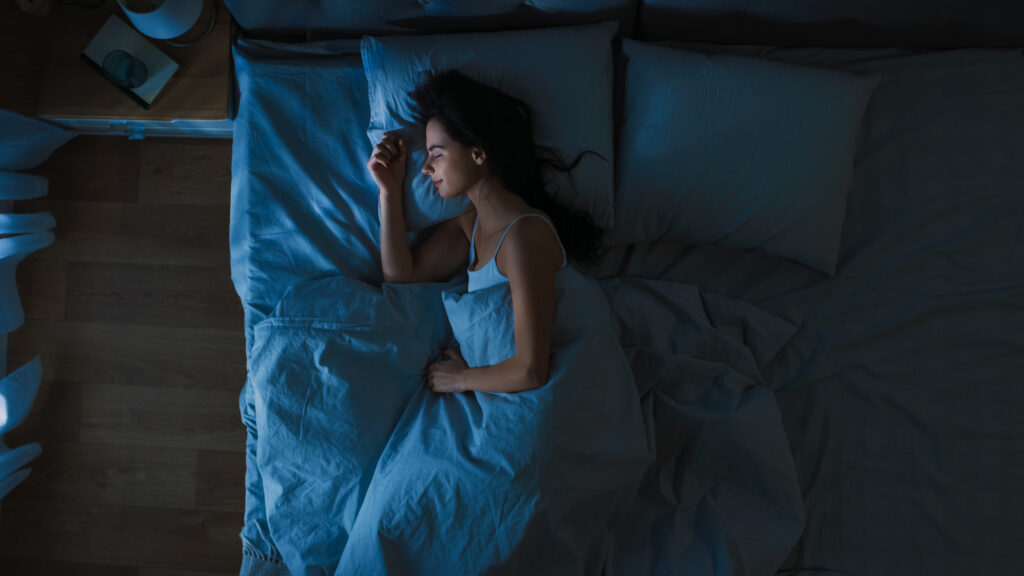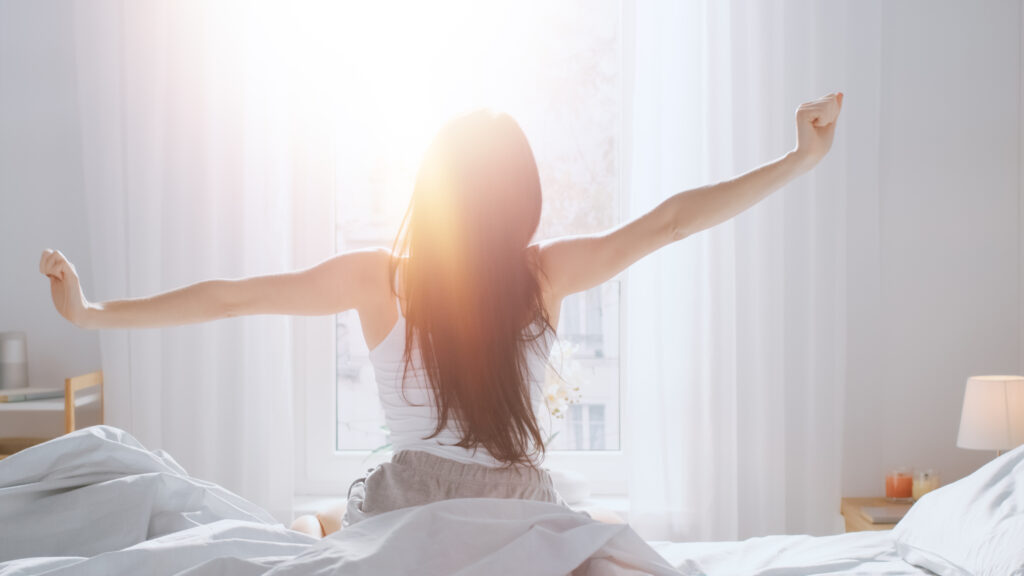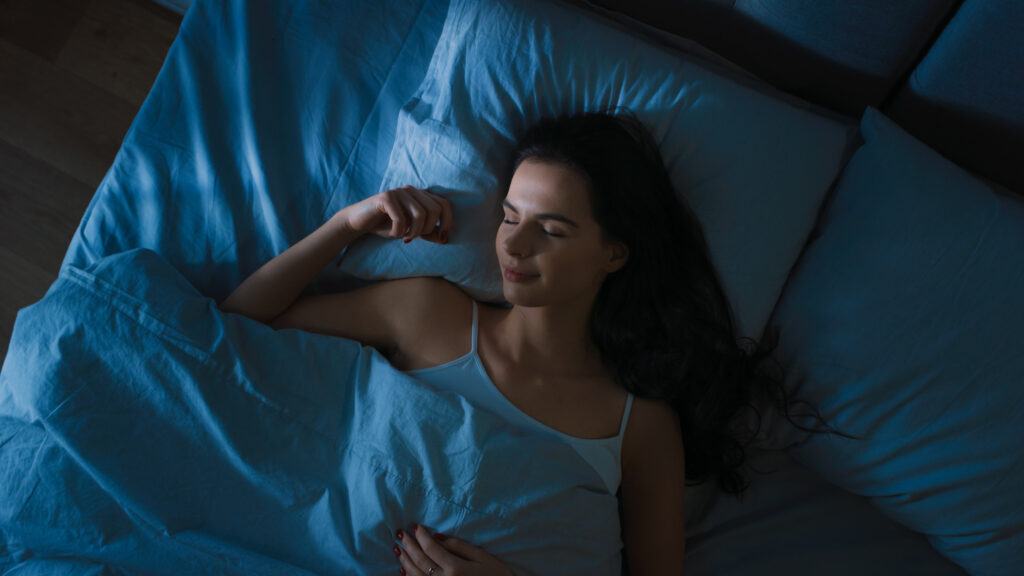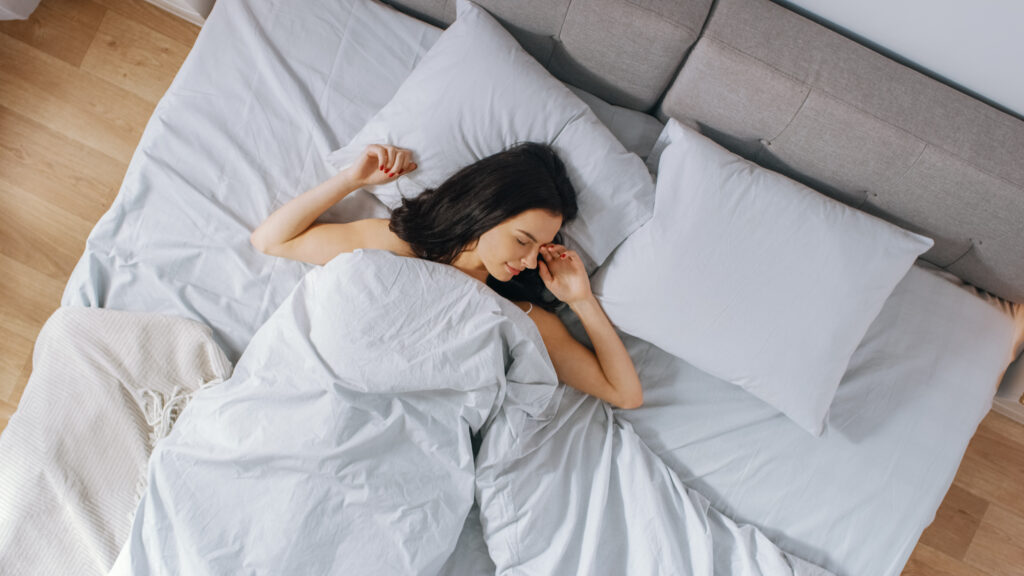The benefits of getting enough quality sleep – and the downsides of not getting it – are huge. Knowing some basics of sleep science can help us better recognize our sleep challenges and implement smart sleep best practices.
How did you sleep last night … and how do you feel today?
Your answers to those two questions are directly related, of course. Getting sufficient quality sleep is vitally important for:
- Health and healing
- Optimal functioning
- Creativity
- Emotional state
- Mood regulation
What’s more, the negative impacts of long-term sleep deprivation are many and varied–and can include hypertension, heart disease, weight gain anxiety, memory loss and lowered immune function.
But while you probably have at least a cursory understanding of the value of sleep, you might not be acting on that knowledge.
Example: Gallup reports that a full 40% of Americans aren’t getting the CDC’s recommended minimum per night (more on that later).
The good news: There’s no shortage of advice on how to improve the quantity and quality of your sleep. Even better, many of the action steps are easy to implement–and in some cases, technology can assist you in your quest for better rest. Here are some of our favorite sleep tips, strategies and hacks.

The Science of Sleep: Circadian Rhythms, Zeitgebers and Chronobiology
To make smart sleep moves that are right for you and your situation, it’s good to first understand some of the foundational science that underpins our bodies.
All people (and all living organisms, for that matter) are governed by a “circadian rhythm,” an internal 24-hour clock-like process. Essentially, sunlight hitting the photoreceptors of our eyes triggers the release of neurotransmitters and hormones that regulate our energy level and sleep cycle. This signaling–combined with environmental darkness cues- produces substances such as adenosine and melatonin in our brain and body that eventually put us to sleep.
In addition to sunlight, there are many other environmental or time-clues- collectively known as “zeitgebers” that synchronize and entrain our biological rhythms. These zeitgebers include the timing, quantity and quality of our food intake; amount of movement and exercise; stress level; and any interaction we have with people, animals and technology.
The tricky part: Not everyone has the same circadian rhythm or ideal sleep cycle. Chronobiology, the science of biological time structure, includes a focus on genetic differences between people. For example: There are “short sleepers”- those who need fewer than six hours of sleep yet function normally–while others are “long sleepers,” who need 10-12 hours a night.
More broadly, some people are genetically determined to be “larks” or early birds who thrive when going to bed and waking up early. Others of us are “owls” and do much better going to sleep and waking up late. It is thought, however, that only about 20 percent of people are either extreme larks or owls.

There’s also the idea that human beings are naturally “biphasic” sleepers–that is, our bodies prefer to sleep in two distinct segments per day (such as six hours at night and a 20-minute nap in the middle of the day) rather than in one long monophasic overnight session.
As far back (at least) as Chaucer’s The Canterbury Tales, for example, there are references to first sleep and second sleep cycles. We’d go to sleep soon after dark, wake up somewhere around midnight to take care of bodily needs or perhaps read and pray, and then fall back asleep an hour later and wake up with the sun. The jury is still out on whether this approach to sleep is better, but there are indications that biphasic sleep has benefits for some.
Managing Your Sleep Environment
So how much sleep do we need? The CDC officially recommends at least seven hours for adults, and more for those younger. But to hit that target, you’ll need to spend more than seven hours in bed-as some of that time you’ll likely be awake. Moreover, once you’ve woken up, it takes time to get back to the deeper stages of sleep that provide substantial benefits–so again, plan to be physically in your bed for more than seven hours.
Proper sleep hygiene begins by considering both external and internal environmental factors. Put differently, both what’s outside of you and what’s inside of you matter.
External Factors
On the outside, you want your external sleep environment to be dark, quiet and comfortably cool. Remember zeitgebers? Researchers found that the single most important environmental step is to eliminate as much light as possible. Blue light from electronics may be particularly harmful to falling asleep because it suppresses melatonin that enables sleep. That said, it may be more important to reduce bright light of any kind rather than worry too much about the particular spectrum of light. In high-light environments, a sleep mask can help.
Additionally, quiet is important. In general, the less noise the better (except perhaps for those who sleep best with simulated environmental sound machines). Comfortable earplugs can help, especially if you sleep with a snorer.

And because your core temperature drops when you sleep, you want things comfortably cool in the room or under our comforter. There is some evidence that a warm bath or shower one to two hours before bedtime helps people sleep by regulating the “temperature circadian system.” As for sleeping with someone else, while intimacy can promote oxytocin release, relaxation and comfort, it increases the chances of noise problems (snoring) and overheating.
Finally, removing all clock faces can potentially reduce worry and anxiety (about not sleeping enough) if we wake during the night.
Internal Factors
To counter the stress and worry that can delay sleep, mindfulness or another type of meditation is often suggested. Some people find breathwork helps them fall asleep. Example:”Box breathing” to a pattern of 4 in, 4 hold in, 4 exhale, 4 hold out. Other breathing patterns can help our parasympathetic nervous system tamp down our flight/fight response, reducing cortisol and making sleep easier.
Then there’s diet. What, how much and especially when we eat make a big difference. Don’t eat or snack for a few hours before bedtime. And while getting enough water is key to health, try to drink it mostly earlier in the day (to minimize nighttime bathroom runs). Similarly, for obvious reasons, limit caffeine and other stimulants, especially later in the day or evening.
Best Practices and Savvy Hacks
Experts generally agree we should keep regular bedtime hours and have a wind-down routine, including staying away from phones and other screens for an hour or more before bedtime. Conversely, to keep your circadian rhythm aligned, it’s good to be exposed to bright light- especially sunlight- soon after waking. And be alert for bedtime procrastination, which these days often means randomly scrolling through social media late into the evening.

What about taking “things” to help us sleep? Alcohol, while frequently used, does not help sleep quality and may harm it. Sleeping pills – perhaps very occasionally appropriate – can be highly problematic, and come with difficult withdrawals and “rebound insomnia” effects.
On the positive side, some find benefit in chamomile tea, melatonin, magnesium or fully legal CBD products.
What should you do if you awaken and can’t fall back asleep?
The consensus is that remaining in bed is counterproductive. Get out of bed, try reading–a book, not a screen- journaling or meditating. Once you get sleepy again, return to bed. And if you’ve had a bad night’s sleep, do not sleep in or go to bed early both of which throw off your circadian rhythm.
Of course, you might have the occasional bad night’s sleep even if you make all the right moves. If so, napping can potentially be helpful if you learn to make napping work for you. For example, most people derive the most benefit from napping for shorter time periods, perhaps ten to 20 minutes. Even if you don’t fall fully asleep, briefly lying down and closing your eyes produces restorative alpha brainwaves.
That said, you’re best off napping earlier in the day, generally no later than 2:00 p.m. If you nap too late, it may be harder to fall asleep (like having a snack before dinner will make you less hungry).
In recent years, sleep tracking rings and wristbands have become available. These slim technological marvels track total hours of sleep, time in each sleep stage, and total recovery metrics based on respiration rate and heart rate variability. Having objective data on sleep – and, in effect, “gamifying” it – may help motivate you to adopt best practices and get the sleep you actually need.
Sleep Dos and Don’ts
- Have regular bedtime and wind-down routines.
- No handheld screens/phones for an hour before bed or right at waking.
- Dim lights an hour before bedtime; take in (sun)light upon rising.
- Avoid alcohol, sleeping pills; consider melatonin, chamomile, CBD.
- Avoid bedtime procrastination.
- If you wake up, get up; come back to bed when sleepy.
- Make napping work for you: limit to 20-30 minutes, and not too late in the day.
- Consider a sleep tracker.
Some Important Caveats to Consider
Not everyone is the same. For example, the CDC’s recommended seven hours per night isn’t appropriate across the board. Sleep is a hot and evolving topic, so not all sleep experts agree on everything.
There are many sleep maladies including chronic insomnia, fatal familial insomnia, delayed sleep phase syndrome and obstructive sleep apnea–that require proper medical attention.
Conclusion
As noted, information and recommendations about sleep are rapidly evolving. If you’re seeking better sleep, try starting with the nearly universally recommended best practices and then consider experimenting with supplements, trackers and the like. And keep at it – implementing good sleep behaviors is not unlike adopting better eating or exercising habits.
We think you’ll find that if you do substantially improve your sleep, you’ll never regret the effort you put into making it happen.
PS. If you want to improve your financial health which may also help you sleep better at night, we’re always here to talk to you about your long-term plan. Please contact us for a complimentary consultation.

